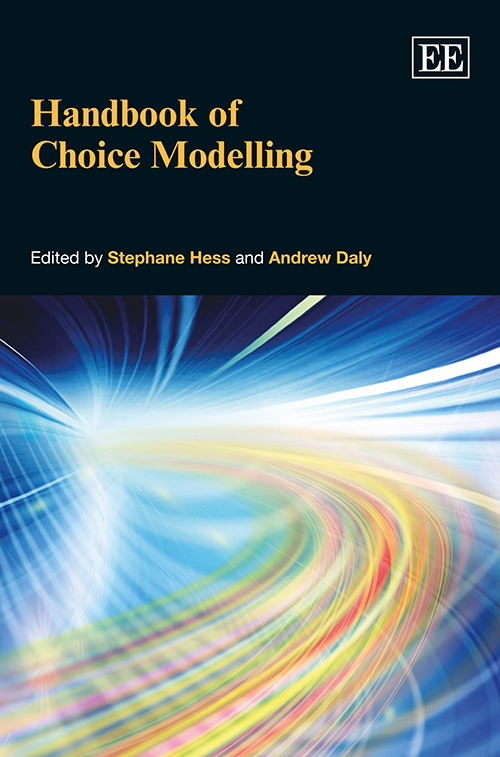This 3-day masterclass – taught over six half-day (evening) sessions – introduces students to choice models, discusses and contrasts the family of available model structures, and covers both estimation on data and the use of models to produce outputs for policy. The course consists of a mix of lectures and discussion sessions covering both theoretical and applied issues.
As Stephane Hess is based in the UK, his course will be offered across 6 evenings, from 6.00 pm to 8.45 pm:
- 6.00 pm to 7.15 pm - session 1
- 7.15 pm to 7.30 pm - break
- 7.30 pm to 8.45 pm - session 2
The course dates are:
- Tuesday, September 14th
- Wednesday, September 15th
- Thursday, September 16th
- Tuesday, September 21st
- Wednesday, September 22nd
- Tuesday, September 28th
This course is being held online via Zoom and run on Australian Eastern Standard Time (GMT +10)

Choice modelling is a specialised area of micro-econometrics that develops and applies mathematical models that represent human decision making. Choice models are used extensively to understand current behaviour and predict future choices in the applied fields of the economic sciences, especially environmental, health, and transport economics. Other application areas include business and marketing. In addition to addressing questions of academic interest, choice modelling informs policy and strategy making in these applied economic disciplines.
This 3-day masterclass – taught over six half-day (evening) sessions – introduces students to choice models, discusses and contrasts the family of available model structures, and covers both estimation on data and the use of models to produce outputs for policy. The course consists of a mix of lectures and discussion sessions covering both theoretical and applied issues.
Stephane Hess is Professor of Choice Modelling and Director of the Choice Modelling Centre at The University of Leeds (UK). Stephane is a globally recognised leader in choice modelling with interests in behavioural models, travel behaviour, health choices, and decision making. His specific academic contributions include developing advanced choice models and empirical contributions across many fields. He is the editor of the Journal of Choice Modelling (the leading international, interdisciplinary journal in choice modelling), the chair of the International Choice Modelling Conference, and co-developer of Apollo (with David Palma, Leeds, UK), a widely used (open-source) estimation software for choice models.
This is a lecture-based masterclass taught in six half-day (evening) sessions over two weeks. The masterclass introduces students to the fundamentals of choice modelling through a series of lectures and discussion sessions.
The masterclass will specifically introduce participants to the family of econometric models that are typically used in choice modelling – both in academic and applied projects. Examples are used throughout the masterclass with application areas including environmental, health, and transport economics.
The masterclass will include a demonstration of the open-source Apollo software for the estimation of choice models. The target audience includes both academic and applied researchers including University researchers and research students, and researchers and policymakers from government agencies and departments.
Session 1:
- Introduction to choice modelling;
- Data for choice modelling (revealed and stated preferences);
- Random utility theory;
- The Multinomial logit model (MNL).
Session 2:
- Estimation theory;
- Introduction to Apollo and MNL in Apollo;
- Specification testing;
- Interpretation of MNL results.
Session 3:
- Models allowing for heightened substitution patterns;
- Nested logit;
- Cross-nested logit;
- Estimation in Apollo and forecasting and elasticities.
Session 4:
- Allowing for heterogeneity in preferences;
- Deterministic and random heterogeneity;
- Mixed Logit;
- Latent Class;
- Advanced model estimation in Apollo.
Session 5:
- Other advanced modelling topics;
- Hybrid choice models;
- Departures from the Random Utility framework.
Session 6:
- Choice modelling in practice;
- Joint estimation on RP and SP data;
- Emerging data sources for choice models;
- Pre- and post-estimation tasks in Apollo.
This is a lecture-based masterclass delivered live online using Zoom in six half-day (evening) sessions.
The masterclass consists of a series of lectures and interactive discussion sessions.
Participants should be willing to participate in these (facilitated) discussion sessions.
Participants should have some familiarity with linear and logistic regression.
There is no requirement for previous experience in choice modelling.
Hess, Stephane and Andrew Daly (eds.) (2013), Choice Modelling: The State-of-the-Art and the State-of-Practice. Cheltenham, UK; Northampton, MA: Edward Elgar Publishers.
1. BOOKING - ACSPRI does not accept ‘expressions of interest’ for course places, i.e. all bookings, are considered firm, and a cancellation fee is charged if you cancel your booking after the early-bird date.
2. DISCOUNT RATE – The discounted rate for ACSPRI members is available to all staff and students of member organisations. To be eligible for this rate:
The course fee must be paid by either the member organisation or by you. Where fees are paid by a non-member organisation the non-member rate applies.
You must either have a valid email address issued by the member organisation; or you must hold, or have a right to hold, a current staff or student identity card from the member organisation.
In addition, to be eligible for a full time student discount the participant must:
Hold, or have a right to hold, a current student identity card from the member organisation;
Be enrolled as a full-time student;
Make payment in full with your application, arrange electronic funds transfer (EFT), or contact ACSPRI to advise credit card details for payment, by the early-bird closing date;
Provide ACSPRI with contact details of your supervisor, so we can request them to confirm your eligibility for the full time student rate.
The early bird rate applies to all bookings paid in full by the early bird close date, otherwise you will be charged at the standard rate.
3. REFUNDS & CANCELLATIONS - Course fees are not refundable unless:
we cancel the course in which you have enrolled; or
you cancel your enrolment before the early-bird closing date.
A cancellation fee of $250 will be charged if you cancel within the period from the early-bird closing date of and one week prior to the commencement of the program. The full course fee will be charged if you cancel within 1 week of the beginning of your course.
4. PRE-REQUISITES - Course descriptions specify course pre-requisites. You must undertake to meet the pre-requisites of the course(s) in which you enrol. If in any doubt, you should contact ACSPRI prior to enrolling.
Delivery of this course is online - via Zoom.
Please ensure you have the following:
- Reliable Internet connection with at least 5Gb per day of data available (i.e. a 5 day course will use about 25Gb of data just on the Zoom application)
- A computer/laptop with the Zoom application installed (free)
- A webcam (built in to most laptops)
- A headset with a microphone (not required but ideal)
- A second monitor/screen if possible
Please also check the course page for specific software requirements (if any).
